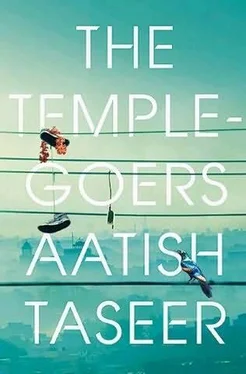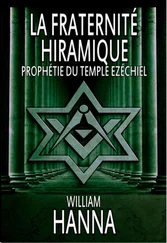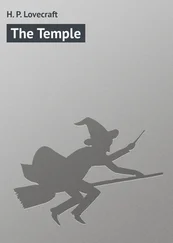These thoughts had prevented me from focusing on the stained ceramic basin and the squalid circle of water I stood over. I wondered if, while holding my breath, I’d kept my eyes closed as well. I knew now that I stood at the source of the smell that pervaded – and always would, no matter what incense was lit or food cooked – the air in the flat. And just before I pulled the flush, a detail impressed itself on me. On a narrow cement windowsill below the paint-splattered glass, there was a thick accumulation of a hard yellow and red substance. Its colour and appearance made me curious enough to touch it. It was smooth and layered. When I dug my nail into it, a little flake came off easily. Wax! The remains of candles, red and yellow candles that had burned to their base. Their blackened wicks were embedded in the pat of wax. No sooner had I realized what the coloured substance was than a looming feature of life in the flat occurred to me: blackouts. It was to long hot nights dotted with red and yellow candles, burning into the morning, that Aakash returned.
I opened the door and found him waiting. He turned the tap in the little sink for me with one hand and held a towel in the other.
In the room outside, the family was ready to go. Five bags of food, offerings and water had been brought out. There were three women, Aakash’s mother, aunt and sister-in-law; and three men, his two brothers, one younger, one older, and his father. And there was the toddler, whose hair was to be offered up, sitting heavily in his father’s arms. I waited for the room to empty. Besides the religious hanging, there was a painting of a Chinese scene, fluorescent green palms, pagodas and bridges on a black felt background. The only other decoration on the pink powdery walls was a narrow framed picture of a red rose, which for all its shabby sentimentality, was somehow affecting.
Aakash’s father, as a testament to its importance, knew every stage of the fifty-kilometre journey from town to temple. He knew the last of the city’s satellite towns with their single-storey constructions gathered close to the road and their multitude of chemists, automechanics and call booths. He knew when the land would become fields dotted for as far as anyone could see with the clay minarets of brick furnaces. He knew the Air Force base with its high walls of bougainvillea that came just before the Haryana border. He knew the flat green fields and pale blue sky of Haryana, once bare save for the odd red-brick construction, but now covered with uncooked bricks drying in the sun and chimneys evenly emitting black smoke. As if in homage to his destination, he spoke of magic on the way.
He spoke at Aakash’s prompting. Since we’d left Delhi, Aakash had become protective of me. He put his elder brother, mother, aunt and sister-in-law in one car, and in my van-like car he put himself in the front next to Uttam, his little brother Anil far in the back and his father and me near each other in the middle row so we could talk. He would turn back every few moments, facilitating the easy flow of conversation and checking that I wasn’t getting bored of the stories. When, occasionally, I looked ahead, I saw the side of his face pressed intently against the seat, his bright, arched eyes ready to wink.
The stories were not simply religious. At the heart of them was not just a reward or a moral intervention from the gods, but rather an emphasis on the powers of Brahmins, the Siddhis, continuing to this day despite the decay of modern times. They seemed designed to expand on what Aakash had said a few days before at Junglee: ‘There’s something in us.’ The message, beyond proving the existence of these powers, was not always clear. In one story, Aakash’s grandfather, killed in war, went to his father before leaving on his fatal mission. The father was old and perhaps sensed something. He asked his son to ask whatever he would of him. The man said, ‘I have so many daughters and only one son. I am not rich. How can I be expected to marry them off?’
‘Over the next six months,’ Aakash’s father said grimly, then chuckled, ‘one of my sisters died every month.’
‘My aunts?’ Aakash asked not with horror but simple curiosity. ‘I have an aunt in Rohtak…’
‘The only one!’ his father said, chuckling again. Then turning to me, he added in Hindi, and cryptically, ‘Sometimes the truth of things has come out of my mouth as well.’ He described the predictions he’d made of transfers in his office, of purses stolen and found where he said they’d be found, and of investments made at opportune times. ‘The place we’re going to today honours the memory of my grandfather, who renounced his remaining years for the sake of his family and community. It’s a story from the last days of the faith. If it were not for him, people would have stopped believing.’
To hear Aakash’s father recall the story made it even stranger than when Aakash had spoken of it in my mother’s flat. Only two generations apart from him was this magical ending to a life.
Aakash knew all the stories. He prompted his father to tell more. Soon Anil, thinner and fairer than Aakash, with uneven teeth clambering over each other, was also prompting stories. I imagined them first told in the small bedroom covered in mattresses, the long nights of summer darkness, the smell of the bathroom, and yet the resilience of people to these things, the stories told anyway, the family life carrying on, the making of Aakash continuing unstopped.
He seemed to have an intimation that beyond the brief new friendship that had arisen between us, my interest in him had other depths. If ever he saw me watching him or I asked him a question about his personal life, his face would brighten as if from the amusement of a private joke between us. ‘You’re writing a book on me, aren’t you?’ he’d laugh, using the English word for book as if a book of that sort could only have been possible in English.
Before arriving at the village temple where the offering of hair was to be made, we stopped at a small town. While his family bought snacks, rearranged their offerings and went to the bathroom, Aakash pulled me into the shade of a teashop. The man, who always made a point of smoking Marlboro Lights, now asked the teashop owner for a single Gold Flake. He spoke in the Haryana dialect, with its threatening inflections, to make me laugh. His eyes blazed mockingly, his manner became at once aggressive and comic. The owner didn’t catch the city joke and handed him the cigarette. Aakash lit it from the roaring blue flame that cradled the steel urn’s blackened base, keeping its contents forever close to a boil. He put it in too far and half its short, cylindrical body blackened, with scattered orange points burning through. Its paper fell from it like dead skin. Aakash handed the cigarette to me after a few drags and slipped his arm around my shoulders. He seemed to take great pleasure in watching his family one by one load into the cars as he smoked with me in the gloom of the teashop. Then he bought one of the many silver packets of pan masala hanging in front of the shop, tore open a corner, and after blowing into it, emptied its contents into his palm. He gave half to me before slapping the rest into his mouth. After a short lull, the brown liquid in the urn seethed.
Our closeness in the teashop faded as the day wore on. It was replaced by a kind of aggression, as if a fault line formed between the recent fact of our friendship and the acknowledgement of difference. And though we forged the common ground on which a friendship might grow, neither of us yielded any easily.
The change in mood began on the way to the village temple, or perhaps even some minutes before, when Aakash’s nephew discovered us in the teashop. He ran in like a hound following a scent, then looked around in confusion, his eyes adjusting to the darkness. Aakash caught him and swung him into the light; the child let out a screech of delight; I winced, reminded of babies on planes and indulgent mothers. Aakash indulged the child too, letting him gnaw at the side of his face.
Читать дальше












